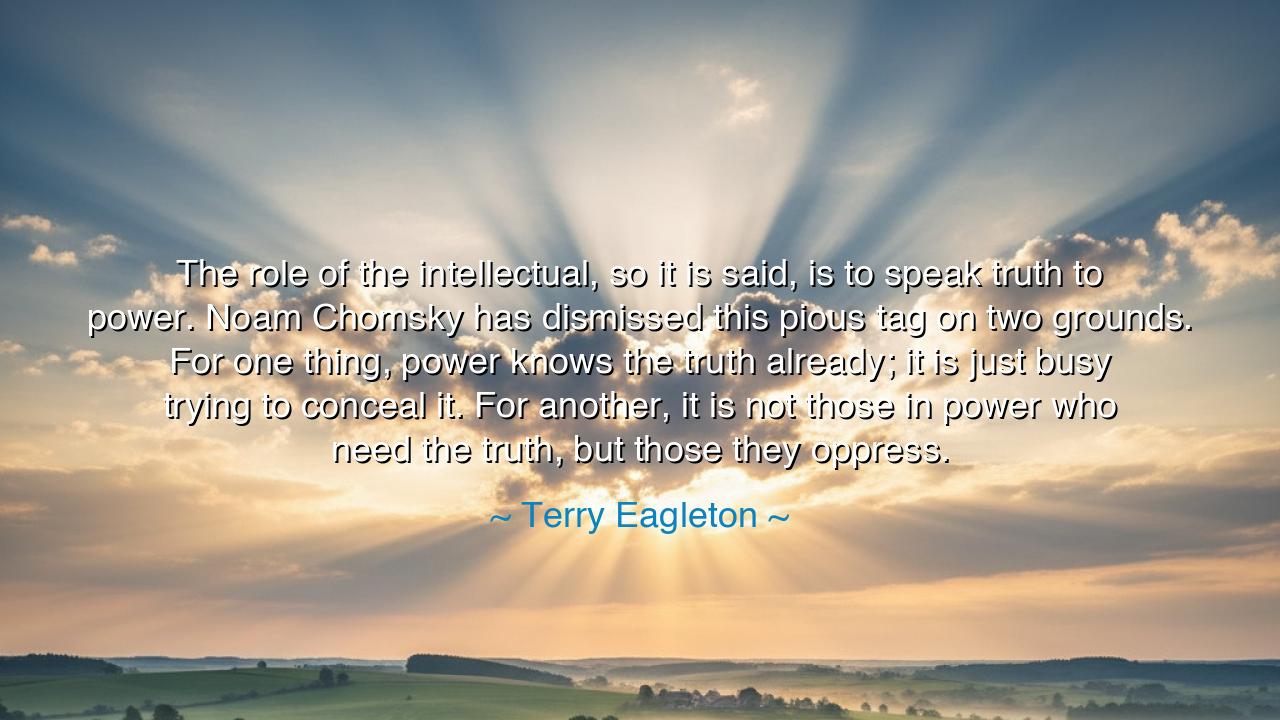
The role of the intellectual, so it is said, is to speak truth
The role of the intellectual, so it is said, is to speak truth to power. Noam Chomsky has dismissed this pious tag on two grounds. For one thing, power knows the truth already; it is just busy trying to conceal it. For another, it is not those in power who need the truth, but those they oppress.






Hear now the words of Terry Eagleton, who unveils the true task of the thinker and the writer: “The role of the intellectual, so it is said, is to speak truth to power. Noam Chomsky has dismissed this pious tag on two grounds. For one thing, power knows the truth already; it is just busy trying to conceal it. For another, it is not those in power who need the truth, but those they oppress.” In these lines, Eagleton gathers the wisdom of Chomsky and places it before us like a mirror. The truth is not unknown to kings and rulers—they know it well, for they are often the ones who shape it, twist it, or bury it. The task of the intellectual, then, is not to awaken the powerful, but to awaken the powerless, to give them the light that has been hidden from them.
The ancients, too, wrestled with this question. The prophets of Israel did not speak to the kings because the kings were ignorant—they cried out because the people were misled, starved, and deceived. Amos thundered not only against palaces but for the ears of the common folk, urging them to rise in justice. Likewise, Socrates walked not in the halls of power but in the marketplace, asking the citizens of Athens to seek wisdom. Power does not need truth, for it already trembles in its shadow; it is the oppressed who need truth, so they may rise with knowledge and break their chains.
Consider the story of the abolitionist Frederick Douglass. He had escaped slavery and gained his freedom, and with fire in his voice he spoke not to persuade slaveholders of their cruelty—for they knew full well the brutality they inflicted—but to awaken those who were silent, the masses who were deceived into believing slavery was natural. His words lit the consciences of the oppressed and the indifferent alike. In him we see Eagleton’s meaning: the intellectual’s role is not to beg the master to repent, but to empower the enslaved with truth that cannot be denied.
The origin of Eagleton’s reflection lies in the modern tradition of radical thought. The phrase “speak truth to power” was once revered as the noble duty of writers and philosophers. Yet Chomsky, in his relentless clarity, exposed its flaw: power rarely changes because of words. Tyrants are not converted by essays, empires are not softened by speeches. They already know the truths of exploitation, of deceit, of violence—they simply labor to conceal it. To aim truth at them is like striking iron with whispers. But to bring truth to the oppressed is to arm them with vision, to give them strength to resist.
This teaching carries a fierce lesson for us: if you would be an intellectual, a writer, a teacher, do not waste your arrows on the armor of the powerful. Turn instead to the people who hunger for knowledge, who thirst for understanding, who have been blinded by propaganda and drowned in lies. For it is they who need truth, and it is they who, once armed with it, can shake the foundations of power itself. Truth in the hands of the powerless is mightier than truth flung at deaf rulers.
The lesson is clear: do not confuse the audience of your words. When you write, when you teach, when you speak, aim not at thrones but at the hearts of those bent under them. Speak to workers, to the poor, to the silenced, to the young, to the fearful. Give them clarity, courage, and knowledge. For power already knows its crimes—it is the oppressed who need to be shown them. In this way, the intellectual becomes not the servant of the powerful, nor the beggar at their gates, but the ally of the oppressed, the torchbearer in dark times.
Practical steps follow. Read widely, not only to sharpen your own vision, but to share it with others. Speak in ways that can be understood, so that truth is not locked in ivory towers but carried into streets and homes. Stand with those who suffer, and let your words be tools of liberation, not ornaments of pride. Above all, remember that the role of the intellectual is not to flatter power with defiance but to feed the hungry with light.
Thus Eagleton’s words, echoing Chomsky, resound like prophecy: power knows the truth, it seeks to hide it. It is the oppressed who need the truth, so they may rise. Let us, then, not waste our words in palaces, but scatter them like seed among the people, that they may grow into trees of justice, whose roots will one day crack the stones of tyranny.






AAdministratorAdministrator
Welcome, honored guests. Please leave a comment, we will respond soon